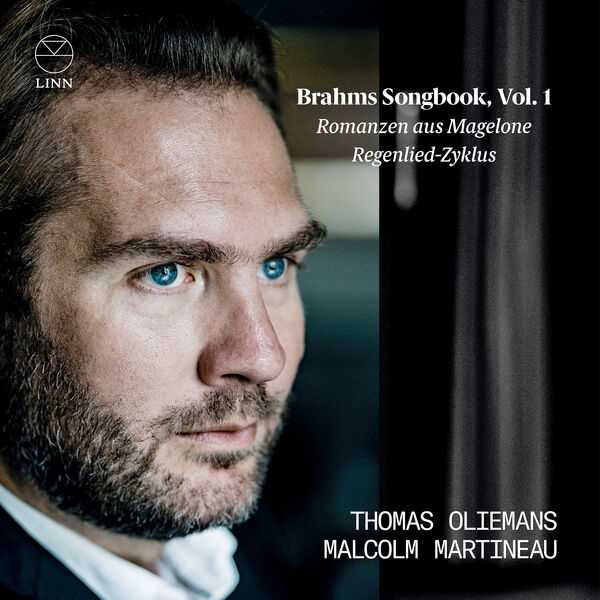

Composer: Johannes Brahms
Performer: Malcolm Martineau, Thomas Oliemans
Format: FLAC (tracks)
Label: Linn
Catalogue: CKD693
Release: 2023
Size: 1.05 GB
Recovery: +3%
Scan: yes
Romanzen aus L. Tieck’s Magelone, Op. 33
01. No. 1, Keinen hat es noch gereut
02. No. 2, Traun! Bogen und Pfeil
03. No. 3, Sind es Schmerzen, sind es Freuden
04. No. 4, Liebe kam aus fernen Landen
05. No. 5, So willst du des Armen
06. No. 6, Wie soll ich die Freude
07. No. 7, War es dir, dem diese Lippen bebten
08. No. 8, Wir müssen uns trennen
09. No. 9, Ruhe, Süssliebchen
10. No. 10, Verzweiflung “So tönet denn, schäumende Wellen”
11. No. 11, Wie schnell verschwindet
12. No. 12, Muss es eine Trennung geben
13. No. 13, Sulima “Geliebter, wo zaudert”
14. No. 14, Wie froh und frisch
15. No. 15, Treue Liebe dauert lange
Vier Lieder nach Gedichten von Klaus Groth “Regenlied”-Zyklus (Johannes Brahms)
16. No. 1, Regenlied “Walle, Regen, walle nieder”
17. No. 2, Dein blaues Auge
18. No. 3, Mein wundes Herz verlangt
19. No. 4, Nachklang “Regentropfen aus den Bäumen”
Malcolm Martineau is the brilliant initiator of this new one-of-a-kind series on Linn. The Brahms Songbook has set the unprecedented goal to record Brahms’s lieder by complete opus number. For its first instalment, Martineau has teamed up with famed Dutch baritone Thomas Oliemans in the expansive Romanzen aus Magelone, Op. 33. Composed between 1861 and 1869, the youthful, inevitably romantic fifteen-song cycle tells the story of a noble warrior, a Neapolitan princess and a sultan’s daughter. The operatic-like cycle goes through the emotions of each character as the tale unfolds. Oliemans’s busy stage career and ‘communicative singing style’ (The New York Times) make him the perfect fit. The album concludes with the virtually unknown ‘Regenlied’ cycle: four songs that were later included in Acht Lieder und Gesange, Op. 59. Volume 2 will see Dame Sarah Connolly and Hanno Muller-Brachmann share the bill.
Why are Brahms’ Romanzen aus Magelone, a.k.a. Magelone Songs, so much less familiar than song cycles by Schubert, Schumann, or even Hugo Wolf? It is largely because it is hard for the listener to get a grip on whether the songs really make up a song cycle at all. On one hand, Brahms was pretty clear; he was, he said, “absolutely against the performance of all the songs as a cycle.” The songs don’t tell an overarching story, and they don’t seem to flow into one another; they vary in length and in tonality. Yet, they do set poems from a single work, a sort of picaresque novel with poems by Ludwig Tieck, written in 1797. Baritone Thomas Oliemans gets it right when he analogizes the songs to “a streaming series nowadays: we recognize characters and landscapes but we also embark on and discover other paths.” No one would call Oliemans’ voice the most beautiful one on the scene today, but these are vivid and affecting performances, and it is because Oliemans puts into practice his understanding of the work. Each song is sculpted into its own little world, and the oddly formal texts come alive. Sample Wir müssen uns trennen, where the knight departs from his beloved to go into battle; Brahms captures the knight’s brief, almost abrupt words, and Oliemans embodies the tension in the musical lines. This release marks the beginning of a series curated by accompanist Malcolm Martineau, with various singers; the accompaniments are crucial in these songs, and Martineau’s work is beautifully detailed. Add in excellent sound from Potton Hall, and one senses the beginning of an important series.



